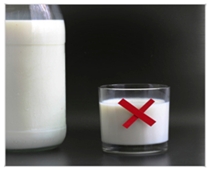 If you told me five years ago that milk and dairy wouldn’t be part of my diet, I’d probably call you crazy.
If you told me five years ago that milk and dairy wouldn’t be part of my diet, I’d probably call you crazy.
Dairy was in all my favorite foods, from pizza to grilled cheese. At that time, I likely would’ve said, “You’re crazy right? Why would I give up such masterpieces? Especially when milk and dairy products strengthen bones, right?”
But that’s changed. Now I avoid milk and dairy because of food sensitivities. I also avoid most processed foods, and milk is typically loaded with antibiotics, growth hormones, and fortified ingredients.
And while society has been trained to believe that we need milk for strong bones and overall health, a new study suggests milk may not be linked to good bone health. In fact, in addition to not strengthening your bones, milk may also decrease your life expectancy.
I’d be shocked if I heard that, too, and maybe even a little angry or confused. But before your thoughts get too carried away, let me explain.
Milk Harms Your Health, Study Says
It is recommended that adults consume three cups of milk or dairy (750 milliliters) every day. That may seem like a lot initially, but most people—you perhaps included—eat a lot more than that. After all, dairy and milk are everywhere you turn, from ice cream to cheese and from butter to sauces. Many people begin the day with milk in their cereal or cream in their coffee or tea. They may also end the day with a tall glass of milk with dinner.
Well, as it turns out, Uppsala University researchers in Sweden recently found that high milk consumption in women may produce greater bone fractures. They also found an association with higher mortality rates in women and men and dairy consumption. The diets of 61,433 women were observed between 1987 and 1990, as well as 45,339 men in 1997. All participants completed questionnaires that revealed their dairy consumption, including cheese, yogurt, and milk.
The women were monitored for 20 years after the initial questionnaire. Of these women, 17,252 experienced a bone fracture, 4,259 experienced a hip fracture, and 15,541 passed away during this time. The researchers determined that the women who consumed three glasses of milk or more daily doubled their risk of death by the conclusion of the study.
Among male participants, there were 10,112 fatalities and only 5,066 fractures 11 years after the questionnaire. The study’s authors suggest that a simple sugar in milk, called galactose, may cause inflammation, which is what lead to the bone fractures.
Alternatives to Your Trusted Cow’s Milk
The study’s authors noted other factors could have affected the results, such as a person’s weight or alcohol consumption. The scientific community may not be giving up on milk just yet; however, it may be a good idea to consider the alternatives to milk.
Goat’s Milk and Sheep’s Milk
Goat’s milk or sheep’s milk are good alternative options to cow’s milk. They contain greater amounts of calcium compared to cow’s milk along with other nutrients. You may be able to find goat’s or sheep’s milk in your grocery store’s organic section or in your local health food store.
Almond Milk
Almond milk is your second alternative option to cow’s milk. Conveniently, almond milk has grown in popularity lately and is now available in most major grocery stores. It is best to choose almond milk without carrageenan; this is because carrageenan may contain monosodium glutamate, which is known to cause digestive issues.
Better yet, you can learn to make your own almond milk. I combine a cup of almonds, a desired sweetener, and four cups of water in a blender for two minutes. Strain the mixture through cheesecloth into a bowl or pitcher and refrigerate for three days.
Also Read : Camel’s Milk the Newest Superfood?
The Milk for Calcium Myth Busted: Top Alternative Calcium Sources
“If I cut out milk and dairy, then where do I get my calcium from?”
That is by far the most frequently asked question regarding the possibility of ending your milk habit. But this is a concern that’s far too easy to squash. When it comes to calcium, milk and dairy products aren’t your only source. In fact, one cup of two-percent milk (246 grams) contains just 295 milligrams (mg) of calcium; in comparison, a cup of almonds contains 376 mg of calcium.
Don’t forget about your leafy greens, too. These vegetables can also be a really good source of calcium, as you can see in the following chart:
| Food | Calcium per cup |
|---|---|
| Spinach | 244.8 mg |
| Collard greens | 226.1 mg |
| Dandelion greens | 187.0 mg |
| Turnip greens | 184.0 mg |
| Watercress | 151.0 mg |
| Mustard greens | 138.0 mg |
| Swiss chard | 101.5 mg |
| Kale | 93.6 mg |
Finally, broccoli (130 mg of calcium per cup), Brazil nuts (186 mg of calcium per cup), and a quarter cup of sesame seeds (351 mg of calcium) are all great ways to get your daily intake of calcium without the help of cow’s milk and dairy products.
Also Read : The Verdict Is In for the Cow’s Milk vs. Goat’s Milk Debate
Sources for Today’s Article:
Mateljan, G., The World’s Healthiest Foods: Essential Guide for the healthiest way of eating (Seattle: George Mateljan Foundation, 2007), 520, 738.
Michaelsson, K., et al., “Milk intake and risk of mortality and fractures in women and men: cohort studies,” BMJ 2014; 349: g6015, doi: 10.1136/bmj.g6015.
Crew, B., “Study suggests milk doesn’t strengthen your bones – it ages you instead,” Science Alert web site, October 30, 2014; http://www.sciencealert.com/study-suggests-milk-doesnt-strengthen-your-bones-it-ages-you-instead.
